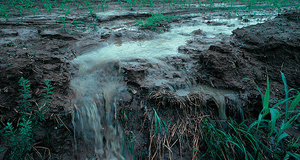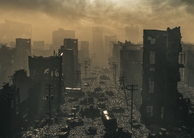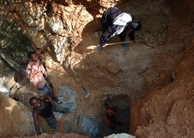From Earth Common Journal VOL. 4 NO. 1The Right and the Good: Communicating Environmental IssuesConclusions“We can't solve problems by using the same kind of thinking we used when we created them,” Albert Einstein (1879-1955). If we think of the environment in terms of short term or Good decisions, deteriorating air, water, and health conditions are cause for worry. Our Good decisions are taking us past the Point of Inflection. Increasing levels of dangerous pollutants are every-where and involve everyone. Limits to growth could be the limits of our imagination. However, the limit of the environment to absorb our growth is very real. Good solutions (exchanging one resource for another or solving problems through chemistry, engineering, or technology) have been successful for the short term. Communicators describe these solutions as imaginative, inspired, and ingenious. However, just-in-time solution seeking seems more like a group weaving its way through decisions while ignoring the real challenge of creating a balance in nature and society. As Harding pointed out, humans move from one self-destructive episode to another. Any change (short-term Good solution) in a multi-connected web of systems (our home, Earth) causes other changes throughout the system. So far we have been able to wiggle out of tight spots by luck or serendipitous discoveries, but much damage remains. Competition brings us to the brink of disaster before another Good solution becomes profitable enough to try. Cooperation provides solid and long-term rules and regulations that are Right and benefit all. Water rights legislation in Alberta shows how Right decisions can be made. Land users including First Nations, agriculturalists, industrialists, and recreationists promote best management practices. Cooperation works in a fair system. The ERCB exempting oil sands operators from meeting regulatory standards is similar to city police not enforcing marijuana laws, except the ERCB then took on the responsibility of changing rules without all stakeholders (vested groups, organizations, or individuals). ERCB Good decisions let industry reach its goal. The Right decision would call on lawmakers to re-examine the rule. It should involve all stakeholders. City Police did that in the marijuana enforcement situation and now that law is being re-examined. What we see is partially dependent on what we are shown. Communicators have a duty to inform, educate, and lead. Environmental communicators have the privilege of explaining how our natural world works: individually and in unison, and in relationship to us. While accomplishing these important tasks, we are bound by moral and ethical codes to tell the truth. However, how a truth is told has a large effect on its interpretation. A communicator in the real world must know and differentiate between Right and Good truths. Nolan and Kirkpatrick (2000) point out the difficulty with evaluating truth. Evaluation is a philosophical judgment reflecting a wide range of philosophical convictions. The definitions of Right and Good must be established. They use the example of determining quality of an educational institution. An institution’s philosophy may differ from what the evaluator thinks. The evaluation of environmental actions or rules can suffer the same fate. It is only when all affected parties have input and are able to compromise or convince that a Right decision can be derived. As Nolan and Kirkpatrick state, Good decisions consider usually insignificant secondary criteria. To expand pollution because jobs are affected or auto sales decline is to render a Good judgment, not a Right one. Are we sovereigns over the world or part of the web, Earth? Sound environmental decisions and evaluations derive from thoughtful and philosophical awareness of facts and consequences. Communicators provide them. In a democracy and with Internet’s tools, everyone speaks. Communicators provide the perspective. We ferret out facts, verify or disprove data, and ask questions. Passmore’s 1974 three states of moral judgment are enriched here. As stated previously, he lists the following:
Today, a fourth should be added: Humans as Ecological beings (interactions with ourselves as part of ecology). As explanation, humans are not the playwright of life, but actors on stage. Humans can no longer see themselves as composers of our play. They now participate in the action as it occurs. As performers, humans must consider themselves, others, groups, and non-human elements as equals. Actors participate, share, and work in unison to ensure success. The play is written; the message set. Script changes are accepted with the input of all stakeholders, and only if the change improves the play. The Great Society speech presented by Johnson at Ann Arbor, Michigan in May 1964, states that a Great Society will judge itself by the quality of its goals (para. 7). He also states that values and visions not be buried under unbridled growth (para. 5). Could society be asking the wrong questions? Should we be examining our goals rather than all growth? When Mr. Watt and his family set their goals of having fun with new technology, acquiring new skills, and being energy independent; the Right and the Good were not at odds. Watt was simply doing things that are good for him, his family, and society. How will he be judged on the quality of his goals? As Michel Jarraud, Secretary-General of the World Meteorological Organization inferred in Gupta’s 2014 article, Climate change is now a battle affecting everyone and we should be worried. The solution to environmental degradation rests in making Right decisions that serve all factions of society and provide balance over the long term. We have a choice and a voice. Why worry? AuthorGoldwin McEwen, BSc, MACT, believes teamwork is the key to success. “No one does anything alone in the economy, technology, or nature. We succeed or fail together,” he says. Achievements over the years reinforce his belief. Goldwin is a well-respected writer, editor, and publisher. For more than 30 years, his researching, writing (fiction and non), editing, communicating, and training projects have been proactive and collaborative. Cooperation with MacEwan writing and designing faculties won him an International Association of Business Communicators (IABC) Capital City Award of Excellence in Communication Skills and Tactics. Goldwin is now president and CEO of Gold Mum Publishing (GMP). He works with a consortium of professionals located around the world. Together they develop bilingual (Mandarin and English) illustrated stories for children. GMP books bring families and communities together, introduce cultural similarities and differences, and contribute to children’s literacy internationally. This year Goldwin brings his experience to the classroom and looks forward to joining students in their quest for knowledge. While enjoying this article, readers discover Goldwin’s passion for this interconnected world. ReferencesArmstrong P, and Ke F., (Wed October 23, 2013, 2:39 AM EDT); “Beijing announces emergency measures amid fog of pollution,” CNN, http://www.cnn.com/2013/10/23/world/asia/china-beijing-smog-emergency-measures/index.html, accessed March 31, 2013. Crookes E. et al. (ed), (2014); Communications and Technology Graduate Program Brochure, University of Alberta, Faculty of Extension, p. 3. Despommier D., Chen S. X., (2004); Cholera History, Medical Ecology, Division of Environmental Health Sciences, Mailman School of PublicHealth, Columbia University, http:/www.medicalecology.org/water/cholera/cholera.htm, accessed March 26, 2014. Dragos Aligica P., (2009); Julian Simon and the “Limits to Growth” Neo-Malthusianism; The Electronic Journal of Sustainable Development, 1(3) http://mercatus.org/sites/default/files/publication/JULIAN_AND_THE_LIMITS_TO_GROWTH_NEO-MALTHUSIANISM.pdf. Dyer G, (March 19, 2014); What the First World War Taught Us, Open Our World, Focused on the future of learning lecture, Edmonton, Athabasca University. Ehrlich, P and Ehrlich A, (1990); The Population Explosion, Simon and Schuster, pp. 37-40. http://dieoff.org/page27.htm. Gupta J, (March 31, 2014); “Everyone vulnerable to climate change effects, says IPCC,” Blog, Chinadialog, https://www.chinadialogue.net/blog/6862-Everyone-vulnerable-to-climate-change-effects-says-IPCC/en, accessed April 2, 2014. Hardings G., (1978); The Tragedy of the Commons, Science, 162, 1244. Hsu A, (February 20, 2012); “Seeing China’s pollution from space,” Chinadialogue, Creative Commons' Attribution-NonCommercial-NoDerivs 2.0 England & Wales License and 2.5 China License, https://www.chinadialogue.net/article/show/single/en/4775-Seeing-China-s-pollution-from-space, accessed March 22, 2014. Johnson, Lyndon Baines, (May22, 1964); The Great Society, speech delivered at Ann Arbor, MI, http://www.americanrhetoric.com/speeches/lbjthegreatsociety.htm, accessed June 1, 2014. Kennedy P. (Host), (Monday March 24, 2014: 2 PM); The Degrowth Paradigm, Ideas in the Afternoon, CBC Radio One. Kerry Brewin, (2014); Our past conflicts have set the bar higher, Blueprint H2O, Alberta, The Expert’s Opinion, CBC Radio; http://www.cbc.ca/blueprintalberta/experts/kerry-brewin.html accessed, March 27, 2014. Lahart, J.; Barta, P.; and Batson, A. (March 24, 2008 ET); “New Limits to Growth Revive Malthusian Fears, Spread of Prosperity Brings Supply Woes; Slaking China's Thirst”; the Wall Street Journal, http://online.wsj.com/news/articles/SB120613138379155707, accessed March 18, 2014. Lu Hui (ed), (October 22, 2013:36:25); “Beijing releases Heavy Air Pollution Contingency Plan,” English News.cn, http://news.xinhuanet.com/english/video/2013-10/22/c_132821147.htm, accessed March 31, 2014. Mathus T.R. (1826); An Essay on the Principle of Population, pp. 4 Preface, Sixth edition, John Murray publisher, London, England, http://www.econlib.org/cgi-bin/searchbooks.pl?searchtype=BookSearchPara&id=malPlong&query=population+and+food accessed March 18, 2014. McEwen, G. E., (1984); Moral Social Decisions and the quality of life, Albertan Geographer, University of Alberta, Geography Department, pp. 15 to 23. Meacham W, (2011); The Good and The Right, http://www.bmeacham.com/whatswhat/GoodAndRight.html#__RefHeading__27_1749462776, accessed March 14, 2014. Michalos A.C., (1981); Environment, Transportation and Housing, North American Social Report, vol. 4, Boston, U.S.A. Reidel Publishing Co. Muir, Patricia, Oct. 4, 2011; Cornucopian versus New Malthusian perspectives, Oregon State University, http://people.oregonstate.edu/~muirp/cornucop.htm, accessed no author, (Dec 13, 2010 1:45 PM); “Alberta not enforcing tailings pond regulations: environmental groups,” HazMat Management Magazine, http://www.hazmatmag.com/news/alberta-not-enforcing-tailings-pond-regulations-environmental-groups/1000396096/?&er=NA, accessed March 12, 2014 no author, (October 17, 2013); Beijing to impose odd-even car ban in heavy pollution, MalayMailOnline, http://www.themalaymailonline.com/drive/article/beijing-to-impose-odd-even-car-ban-in-heavy-pollution, accessed March 31, 2014. no author, (October 17, 2013, 17:19); “Beijing to impose odd-even car ban on polluted days,” Xinhua, China Daily News, http://www.chinadaily.com.cn/china/2013-10/17/content_17040809.htm, accessed March 31, 2014 no author, (Wed., 26 March, 2014); “Guinea’s Ebola outbreak: ‘There are far worse diseases out there,” CBC News, http://news.ca.msn.com/top-stories/guinea%E2%80%99s-ebola-outbreak-%E2%80%98there-are-far-worse-diseases-out-there%E2%80%99, accessed March 26, 2014, no author, (Sun March 30, 2014); “Heavy Smog alert for Beijing as pollution levels goes high; China on red alert over pollution,” Wn.com, http://article.wn.com/view/2014/02/21/Heavy_smog_alert_for_Beijing_as_pollution_levels_goes_high_t/, accessed March 31, 2014. (no author, n. d.; About Page, Club of Rome official Site, http://www.clubofrome.org/?p=324, accessed March 20, 2014). no author, n. d.; Quotes, Think exist.com, http://thinkexist.com/quotation/we_can-t_solve_problems_by_using_the_same_kind_of/15633.html accessed March 14, 2014. no author, n. d.; Tailings Management, Suncor, http://www.suncor.com/en/responsible/3229.aspx?redir=TRO, accessed March 20, 2014, no author, n. d.; “Tailing Ponds,” CAPP, Environment and Community, Sidebar Government Relations, http://www.capp.ca/environmentCommunity/land/Pages/TailingsPonds.aspx, accessed Wednesday March 12, 2014 no author, n. d.; “Tailings,” The Pembina Institute, http://www.pembina.org/oil-sands/os101/tailings, accessed March 16, 2014 Nolan, R.T. and Kirkpatrick, F.G., (2000); Living Issues in Ethics, To Excel Publisher, iUniverse.com, Ltd., Lincoln, N.E, USA, http://www.philosophy-religion.org/living/philosophy/1.pdf, accessed March 28, 2014. Passmore J., (1974); Man’s Responsibility for Nature, Surrey England, Unwin Brothers Ltd. Pielke R. Jr. and de Graaf J., (March 27, 2014); “Can we have prosperity without growth?,” Chinadialog, under Creative Commons' Attribution-NonCommercial-NoDerivs 2.0 England & Wales License and 2.5 China License. https://www.chinadialogue.net/article/show/single/en/6853-Can-we-have-prosperity-without-growth-, accessed April 1, 2014. Randers, J. and Maxton G., et al, (11/12/13 and 12/12/13); Limits to Growth: Beyond the Point of Inflection, UNSW Australia, http://www.clubofrome.org/?p=6828, accessed March 10, 2014. Sayre K., (1981); Mans Responsibility for Nature, Surrey England, Unwin Brothers Ltd. Shadbolt P., (Tue March 11, 2014, 4:35 AM EDT); “Defending China's 'Great Firewall': there's a course for that,” CNN, http://www.cnn.com/2014/03/11/world/asia/china-managing-internet-use-course/index.html?iid=article_sidebar, accessed April 1, 2014. Watt S., (March 13, 2014); personal correspondence. White Jr. L., (1967); “The Historical Roots of Our Ecological Crisis,” Science, Issue 155: pp. 1205 to 1207. Wingrove, Josh, (Wednesday, Mar. 05 2014, 10:22 PM EST); “Ottawa considers softening marijuana laws,” The Globe and Mail, http://www.theglobeandmail.com/news/politics/mackay-hints-at-loosening-of-marijuana-laws/article17317503/?cmpid=rss1, accessed March 15, 2014. Suggested Reading from Inquiries Journal
Inquiries Journal provides undergraduate and graduate students around the world a platform for the wide dissemination of academic work over a range of core disciplines. Representing the work of students from hundreds of institutions around the globe, Inquiries Journal's large database of academic articles is completely free. Learn more | Blog | Submit Latest in Environmental Studies |

















